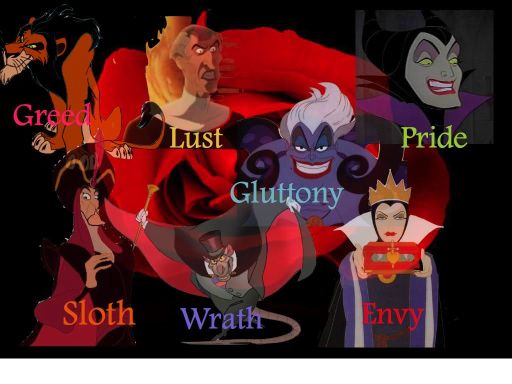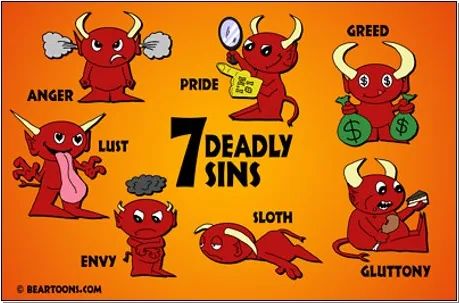
|
|
Gospel Topics

Seven Deadly Sins of Zion
I have always thought it was interesting that the Catholics have two categories of sins: Venial and Deadly. To start with the word venial is strange to me, but those are the less serious sins. So I would expect that the serious or deadly sins would involve things like murder, adultery, etc. really bad stuff. But when you look at the list of deadly sins my first impression was that these are the minor ones. Did I get the lists mixed up? The Seven Deadly (or Mortal) sins are: Pride, Envy, Gluttony, Wrath, Greed and Sloth. Who would have thought that being lazy (sloth) was considered a deadly sin?
However, I now realize that these "seven mortal sins" are the foundation of things like murder and adultery. If we can reduce the effect of these sins or eradicate them from our lives, we will lose all desire for evil. We need to seek for the Savior's help for this change to take place in our lives. We need the Holy Ghost to sanctify us so that we will lose any desire for sin and then we will be ready for Zion.
Therefore they were called after this holy order, and were sanctified, and their garments were washed white through the blood of the Lamb. Now they, after being sanctified by the Holy Ghost, having their garments made white, being pure and spotless before God, could not look upon sin save it were with abhorrence; and there were many, exceedingly great many, who were made pure and entered into the rest of the Lord their God. (Alma 13:11-12)
The Catechism of the Catholic Church explains the reason for the categorization: "Mortal sin, by attacking the vital principle within us – that is, charity – necessitates a new initiative of God's mercy and a conversion of heart which is normally accomplished within the setting of the sacrament of reconciliation." These are also called Capital Sins (comes from Latin caput, head) because they engender other sins and vices.(Wikipedia)
In D&C 101 the Lord tells the saints why they were not able to build Zion.
6 Behold, I say unto you, there were jarrings, and contentions, and envyings, and strifes, and lustful and covetous desires among them; therefore by these things they polluted their inheritances.
If we look at these various actions "jarrings, contentions, envyings, strifes, lustful & covetous desires" we can see that they have their foundation in the 7 deadly sins. Why would there be jarrings and contentions? Possibly because they didn't think the bishop was being fair in his distributions from the storehouse and dividing up of the inheritances in Zion. And the foundation of those beliefs would be because people were proud, they envied the possessions of others, they had greed and lusted for power and authority. A Zion group requires that all contribute and if some were slothful, that might lead to wrath--another sin. Or it could be that some people would simply take more than their need because of their gluttony.
Although there are many other sins and character flaws that could
be
discussed that limit our participation in Zion, I think it is
interesting to see how these 7 sins can be examined as serious
impediments to Zion.
The seven deadly sins really are deadly because they limit our ability to live together in Zion. If we can't overcome these natural inclinations, we will die as to Zion. Our physical and spiritual growth will come to an end.
Many of us claim that we would love to live in Zion. But can we abide the conditions. We have a fanciful notion of what it means to have "all things in common". But do we realize the terms of the distribution?
Wherefore,
let
my servant Edward Partridge, and those whom he has chosen, in
whom
I am well pleased, appoint unto this people their portions,
every man
equal according to his family, according to his circumstances
and his
wants and needs.
And the money which is left unto this people—let
there be an agent appointed unto this people, to take the money
to
provide food and raiment, according to the wants of this people.
(D&C 51:3, 8)
Notice that this revelation defines that the distribution will be made to people according to "the wants of this people". How many of us can refrain from judging the wants of other people? We have the idea that we will all share equally. But that is not how the Lord has designed the system. It is based on stewardship and agency. Can we stand to see someone supported in their wants, when our wants are much more modest. Are we free enough for the sin of envy to allow this and still fully love and support our fellow saints?
It is interesting to also observe the corresponding virtues
| Vice | Virtue |
| Pride | Humility |
| Envy | Kindness |
| Gluttony | Temperance |
| Lust | Chastity |
| Wrath | Patience |
| Greed | Charity |
| Sloth | Diligence |
Following images from Bearman Cartoons (used with permission)

Pride
In almost every list, pride, is considered the original and most serious of the seven deadly sins, and the source of the others. It is identified as believing that one is essentially better than others, failing to acknowledge the accomplishments of others, and excessive admiration of the personal self. Dante's definition was "love of self perverted to hatred and contempt for one's neighbour".(Wikipedia)
The authors of the Book of Mormon felt that it was very important that we understand pride and the problems of pride. They repeatedly gave us examples of pride and humiliation. Although pride is only mentioned 3 times in the New Testament, it is mentioned 57 times in the Book of Mormon and 9 times in the Doctrine and Covenants. The Old Testament also gives us many examples of pride where it is mentioned 43 times.
And I know that ye do walk in the pride of your hearts; and there are none save a few only who do not lift themselves up in the pride of their hearts, unto the wearing of very fine apparel, unto envying, and strifes, and malice, and persecutions, and all manner of iniquities; and your churches, yea, even every one, have become polluted because of the pride of your hearts. (Mormon 8:36)
Pride and Zion can't exist at the same time. We have the example in the Book of Mormon where they were able to live united as a Zion society for 200 years, but then pride came into their community.
And now, in this two hundred and first year there began to be among them those who were lifted up in pride, such as the wearing of costly apparel, and all manner of fine pearls, and of the fine things of the world. And from that time forth they did have their goods and their substance no more common among them. And they began to be divided into classes; and they began to build up churches unto themselves to get gain, and began to deny the true church of Christ. (4 Nephi 1:24)

Envy
Like greed and lust, Envy is characterized by an insatiable desire. Envy is similar to jealousy in that they both feel discontent towards someone's traits, status, abilities, or rewards. The difference is the envious also desire the entity and covet it. Envy can be directly related to the Ten Commandments, specifically, "Neither shall you desire... anything that belongs to your neighbour."(Ex. 20:17) Dante defined this as "a desire to deprive other men of theirs". (Wikipedia)
Envy is a desire for other people's things. Or simply hatred of others' good fortune.
For where envying and strife is, there is confusion and every evil work. (James 3:16)
Behold, I say, is there one among you who is not stripped of envy? I say unto you that such an one is not prepared; and I would that he should prepare quickly, for the hour is close at hand, and he knoweth not when the time shall come; for such an one is not found guiltless. (Alma 5:29)
Joseph Smith was the recipient of both the wrath and envy of man.
And as for the perils which I am called to pass through, they seem but a small thing to me, as the envy and wrath of man have been my common lot all the days of my life; and for what cause it seems mysterious, unless I was ordained from before the foundation of the world for some good end, or bad, as you may choose to call it. Judge ye for yourselves. (D&C 127:2)
In a Zion society you can imagine the problems that envy will cause. Instead of worrying about how much another person has that you don't have, you must be filled with praise for them and their situation. You should only be looking at how you can help others with no analysis with a goal of comparison or ranking.

Gluttony
Derived from the Latin gluttire, meaning to gulp down or swallow, gluttony is the over-indulgence and over-consumption of anything to the point of waste. In Christianity, it is considered a sin if the excessive desire for food causes it to be withheld from the needy (Wikipedia)
Yea, all things which come of the earth, in the season thereof, are made for the benefit and the use of man, both to please the eye and to gladden the heart; Yea, for food and for raiment, for taste and for smell, to strengthen the body and to enliven the soul. And it pleaseth God that he hath given all these things unto man; for unto this end were they made to be used, with judgment, not to excess, neither by extortion.(D&C 59:20
Since there are "no poor among them" in a Zion society. All that the society has is shared so that nobody goes without. Any gluttony or wanton excess use of resources means that there is less to share with others. All members of the society must be judicious in how that use what they have so that they will be wise steward and not wasteful.

Lust
Lust, or lechery is an intense desire. Lust could be exemplified by the intense desire of money, food, fame, power or sex.(Wikipedia)
Love not the world, neither the things that are in the world. If any man love the world, the love of the Father is not in him. For all that is in the world, the lust of the flesh, and the lust of the eyes, and the pride of life, is not of the Father, but is of the world. And the world passeth away, and the lust thereof: but he that doeth the will of God abideth for ever. (1 John 2:15-17)
Then said Jesus unto his disciples, If any man will come after me, let him deny himself, and take up his cross and follow me. And now for a man to take up his cross, is to deny himself all ungodliness, and every worldly lust, and keep my commandments. (JST Matt. 16:25-26)
Lust leads to satisfying individual selfish and covetous desires. Whether they be illicit sexual relationship or passions for power and control, it will disrupt a unified society. Satisfaction of such base desires will stratify a group of people and disrupts the unity that is required in Zion. You can't have rich and poor and still have Zion.
Lust can tear apart families and friendships.

Wrath
Wrath, also known as "rage", may be described as inordinate and uncontrolled feelings of hatred and anger. Wrath, in its purest form, presents with self-destructiveness, violence, and hate that may provoke feuds that can go on for centuries. Wrath may persist long after the person who did another a grievous wrong is dead. Feelings of anger can manifest in different ways, including impatience, revenge, and self-destructive behavior, such as drug abuse or suicide.Wrath is the only sin not necessarily associated with selfishness or self-interest, although one can of course be wrathful for selfish reasons, such as jealousy (closely related to the sin of envy). Dante described vengeance as "love of justice perverted to revenge and spite". In its original form, the sin of wrath also encompassed anger pointed internally as well as externally. Thus suicide was deemed as the ultimate, albeit tragic, expression of hatred directed inwardly, a final rejection of God's gifts. (Wikipedia)
Wherefore, my beloved brethren, let every man be swift to hear, slow to speak, slow to wrath: For the wrath of man worketh not the righteousness of God. (James 1:19-20)
In a Zion society their is no place for wrath against other members of the society. Such wrath would only create feelings that could lead to other sins such as hate, envy and pride.
Seeing ye have purified your souls in obeying the truth through the Spirit unto unfeigned love of the brethren, see that ye love one another with a pure heart fervently: (1 Pet. 1:22)
No power or influence can or ought to be maintained by virtue of the priesthood, only by persuasion, by long-suffering, by gentleness and meekness, and by love unfeigned; By kindness, and pure knowledge, which shall greatly enlarge the soul without hypocrisy, and without guile— (D&C 121:41-42)

Greed
Greed, also known as avarice, cupidity or covetousness, is, like lust and gluttony, a sin of excess. However, greed . . . is applied to a very excessive or rapacious desire and pursuit of material possessions. . . . Scavenging and hoarding of materials or objects, theft and robbery, especially by means of violence, trickery, or manipulation of authority are all actions that may be inspired by Greed. . . .As defined outside of Christian writings, greed is an inordinate desire to acquire or possess more than one needs, especially with respect to material wealth. (Wikipedia)And he said unto them, Take heed, and beware of covetousness: for a man’s life consisteth not in the abundance of the things which he possesseth. (Luke 12:15)
Since the foundation of Zion is built on having all things in common, you can imagine how difficult it would be for a greedy person to live among a Zion society. The whole foundation of the society is built on no desire for prominence or the possession by one more than they need.

Sloth
Sloth can entail different vices. While sloth is sometimes
defined
as physical laziness, spiritual laziness is emphasized. Failing to
develop spiritually is key to becoming guilty of sloth. In the
Christian faith, sloth rejects grace and God.
Sloth has also
been defined as a failure to do things that one should do. By this
definition, evil exists when good men fail to act.(Wikipedia)
Thou shalt not be idle; for he that is idle shall not eat the bread nor wear the garments of the laborer. (D&C 42:42)
Those who are slothful would be disappointed with the arrangement in the parable of the Laborers as told in Matthew chapter twenty. At the end of the day each laborer was paid the agree amount, even though some had worked all day and some only an hour. It isn't important that we get paid at the same rate for our time, but only that we are willing to work and then accept the pay as was offered.
A Zion society will require much work to allow it to accomplish it's goals. There can't be concern about who is working more or less. But all must be anxiously engaged and busy helping to make the community successful. The dole can never find an easy place in Zion.






